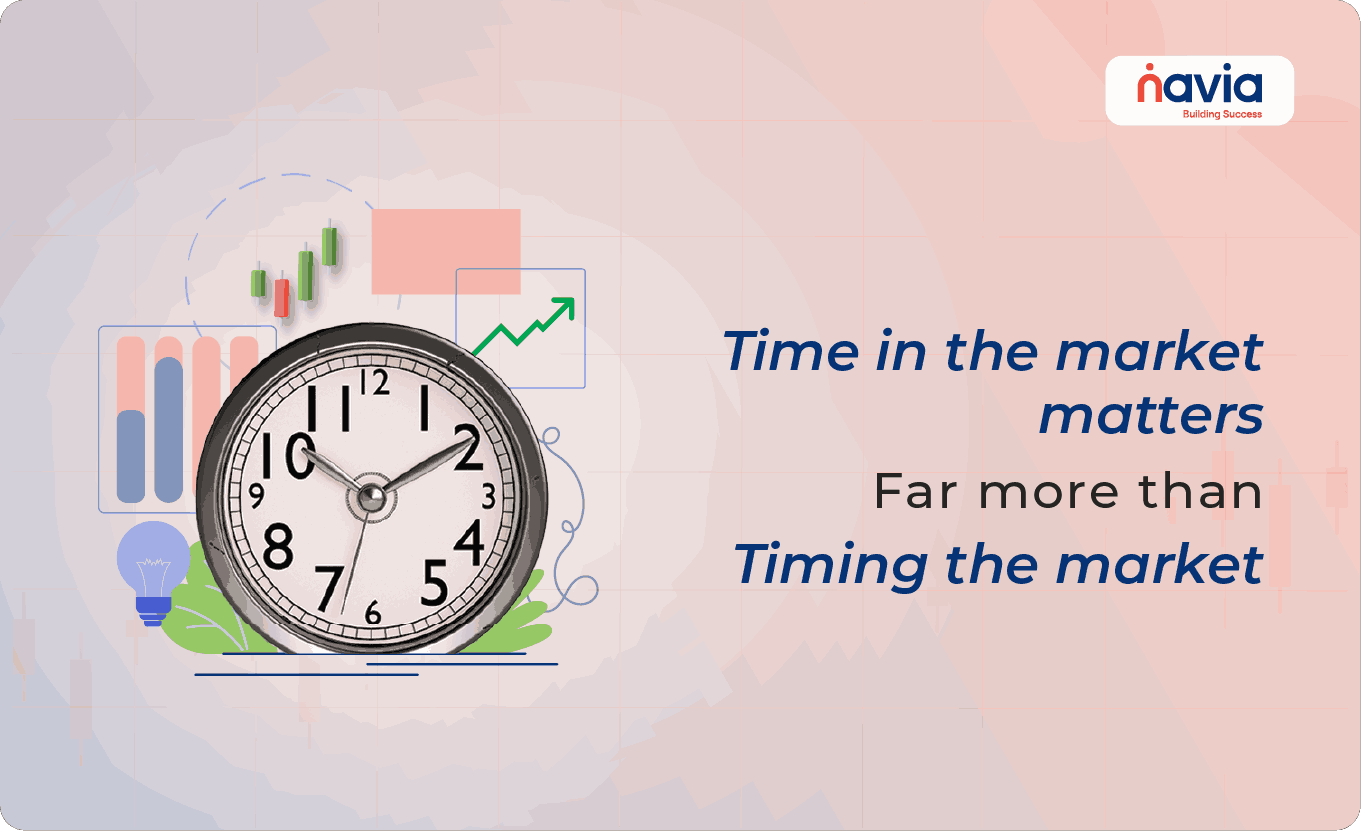Time in the market matters far more than timing the market

Investors often wonder whether starting a Systematic Investment Plan (SIP) at the market’s peak or bottom yields better returns. Conventional wisdom might suggest waiting for the market to decline before investing. However, a detailed analysis based on historical market data from the BSE Sensex TRI reveals some surprising insights.
Analysis Overview
The study considered various market cycles over the past 27+ years. Two hypothetical investors started SIPs of ₹10,000 per month:
1. Investor A: Started SIP at the market’s peak (just before a major correction).
2. Investor B: Started SIP at the market’s bottom (after the correction).
Findings from Historical Data
| Market Cycle | SIP Start Month | BSE Sensex TRI Levels | Market Correction (%) | Correction Tenure (Months) | SIP Period (Years) | Amount Invested (Lakh) | Valuation as on 31-May-24 (Lakh) | Difference in Invested Amount (Lakh) | Difference in Final Value (Lakh) | SIP XIRR (%) |
| 1 | Sep’96 | 3563 | -21% | 3.3 | 27.7 | ₹ 33.3 | ₹ 379.7 | ₹ 0.3 | ₹ 13.8 | 14.6% |
| Dec’96 | 2803 | 27.5 | ₹ 33.0 | ₹ 365.9 | 14.6% | |||||
| 2 | Aug’97 | 4617 | -37% | 15.7 | 26.8 | ₹ 32.2 | ₹ 342.5 | ₹ 1.5 | ₹ 46.5 | 14.7% |
| Nov’98 | 2888 | 25.5 | ₹ 30.7 | ₹ 296.0 | 15.0% | |||||
| 3 | Feb’00 | 6313 | -54% | 19.3 | 24.3 | ₹ 29.2 | ₹ 252.7 | ₹ 1.9 | ₹ 47.7 | 15.1% |
| Sep’01 | 2874 | 22.7 | ₹ 27.3 | ₹ 205.0 | 15.3% | |||||
| 4 | Jan’04 | 7168 | -27% | 4.1 | 20.4 | ₹ 24.5 | ₹ 121.3 | ₹ 0.4 | ₹ 6.4 | 13.8% |
| May’04 | 5229 | 20.0 | ₹ 24.1 | ₹ 114.9 | 13.8% | |||||
| 5 | May’06 | 15186 | -29% | 1.1 | 18.1 | ₹ 21.7 | ₹ 80.8 | ₹ 0.1 | ₹ 0.9 | 13.1% |
| Jun’06 | 10790 | 18.0 | ₹ 21.6 | ₹ 79.9 | 13.1% | |||||
| 6 | Jan’08 | 25756 | -60% | 14.0 | 16.4 | ₹ 19.7 | ₹ 67.2 | ₹ 1.4 | ₹ 9.8 | 13.6% |
| Mar’09 | 10216 | 15.2 | ₹ 18.3 | ₹ 57.3 | 13.8% | |||||
| 7 | Nov’10 | 26968 | -27% | 13.5 | 13.6 | ₹ 16.3 | ₹ 45.5 | ₹ 1.3 | ₹ 6.4 | 14.1% |
| Dec’11 | 19759 | 12.4 | ₹ 15.0 | ₹ 39.1 | 14.4% | |||||
| 8 | Jan’15 | 40594 | -21% | 13.0 | 9.3 | ₹ 11.3 | ₹ 23.3 | ₹ 1.3 | ₹ 4.0 | 15.0% |
| Feb’16 | 31911 | 8.3 | ₹ 10.0 | ₹ 19.4 | 15.6% | |||||
| 9 | Jan’20 | 61221 | -38% | 2.2 | 4.4 | ₹ 5.3 | ₹ 7.7 | ₹ 0.2 | ₹ 0.3 | 17.4% |
| Mar’20 | 38017 | 4.2 | ₹ 5.1 | ₹ 7.4 | 18.1% |
Successful SIP: The Smart Investor’s Choice!
A successful SIP is more about “Starting Early”, maintaining the discipline of “Investing Regularly”, investing for the “Long Term” to achieve our “Financial Goals” and less about “Which Date”, “Which Frequency”, “At what stage of the Market Cycle” etc.

Key Insights
Marginal Return Difference:
● SIPs started at the market bottom generated slightly higher returns (XIRR) due to better entry points.
● However, the difference in returns was minimal over the long term.
Wealth Creation Advantage:
● SIPs started at the top accumulated significantly higher corpus values, despite slightly lower XIRRs.
● This is because these SIPs invested for longer durations and deployed more capital.
Cost of Delay:
● Delaying SIPs until the market reaches a perceived bottom can be costly.
● Historical data shows that time in the market matters far more than timing the market.
Why Market Timing Doesn’t Matter Much
● Unpredictable Corrections: No one can consistently predict market tops or bottoms.
● Power of Compounding: SIPs running longer see higher compounding benefits, even if started at market highs.
● Reduced Volatility Over Time: Longer SIP periods reduce the impact of market volatility.

Final Verdict
The study makes it clear: Start your SIP as early as possible. Waiting for a market dip could mean losing valuable time for compounding and wealth creation.
Key Takeaway
The biggest risk is not the market, but missing out on compounding by delaying your SIP. Start early, invest regularly, and focus on the long-term journey rather than market cycles.
Do You Find This Interesting?
DISCLAIMER: Investments in the securities market are subject to market risks, read all the related documents carefully before investing. The securities quoted are exemplary and are not recommendatory. Brokerage will not exceed the SEBI prescribed limit.






